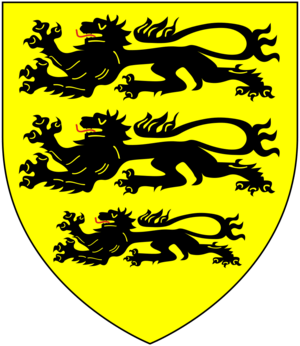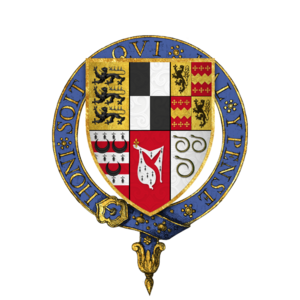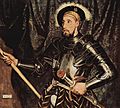Nicholas Carew (courtier) facts for kids
Quick facts for kids
Nicholas Carew
|
|
|---|---|
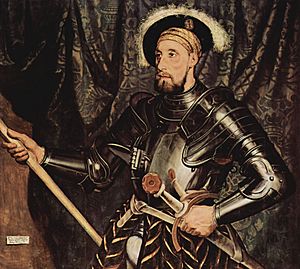
Sir Nicholas Carew
|
|
| Successor | Sir Francis Carew |
| Born | c. 1496 Carew Manor, Beddington, Surrey. |
| Died | 3 March 1539 Tower Hill, London, England. |
| Nationality | English |
| Residence | Carew Manor |
| Spouse(s) | Elizabeth Bryan |
| Issue | Mary Carew, Lady Darcy Anne Carew, Lady Throckmorton Elizabeth Carew Sir Francis Carew Isabel Carew-Saunders |
| Parents | Sir Richard Carew Malyn Oxenbridge |
Sir Nicholas Carew was an important English courtier and diplomat. He lived during the time of King Henry VIII. Sir Nicholas was from Beddington in Surrey. He was a close friend of the King. Sadly, his life ended in 1539. This happened because he was accused of being part of a plot against the King.
Contents
Early Life and Court Roles
Nicholas Carew was born around 1496. His father was Sir Richard Carew. His mother was Malyn Oxenbridge. When Nicholas was just six years old, he joined the household of the young King Henry VIII of England. They grew up and studied together.
In the early years of King Henry's rule, Nicholas became well-known at court. He was very skilled at jousting, which was a popular sport where knights on horseback fought with lances. People admired his bravery. By 1515, King Henry even gave him his own special jousting area in Greenwich. Nicholas was made a knight before 1517.
He held many important jobs at court. One of his main roles was Master of the Horse. This meant he was in charge of the King's horses and stables. He also oversaw forests and was a chief squire. In 1536, he became a Knight of the Garter. This was a very high honor given by the King.
Sir Nicholas also worked as a diplomat. He traveled to France twice. In 1521, he visited King Francis I of France. The French King was said to have liked him very much. His second trip was in 1524. He went to peace talks between France and the Holy Roman Empire.
Nicholas Carew was popular with King Henry VIII. The King enjoyed spending time with him. However, a powerful church leader named Cardinal Wolsey thought Nicholas had too much influence. In 1518, Wolsey managed to have Nicholas sent away from court. He was sent away again in 1519 to Calais. But Nicholas always found his way back to the King's side.
A Changing Politician
In 1522, Nicholas Carew became the Master of the Horse again. He kept this job until his death. He often went on diplomatic trips to Paris. King Francis I of France thought highly of him. He even encouraged King Henry to promote Nicholas. Nicholas, who was once known for being a bit wild, became a serious politician.
In 1528, Nicholas was allowed back into the King's private group of advisors. This might have been because of his relative, Anne Boleyn. She was becoming very close to the King.
However, Nicholas Carew started to dislike Anne Boleyn's growing power. He felt she was using her position unfairly. He showed support for Queen Catherine, who was King Henry's first wife. He also supported Princess Mary, Catherine's daughter. In 1531, he began to work against Anne.
Later, in 1536, Nicholas joined forces with Thomas Cromwell. Cromwell was a powerful advisor to the King. Together, they helped bring down Queen Anne. Around this time, King Henry chose Nicholas to become a Knight of the Garter. This fulfilled a promise made to the French King.
After the King closed down many monasteries in 1537, Nicholas received land. He was given the manor of Coulsdone. This land had belonged to a monastery.
The Downfall of Sir Nicholas
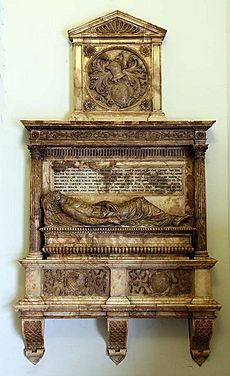
In late 1538, Sir Nicholas Carew fell out of favor with King Henry. He had reacted angrily to an insult from the King. Some historians believe he was also in trouble for supporting Princess Mary.
Then, letters written by Nicholas were found. These letters seemed to show he was involved in a plot. This plot was called the Exeter Conspiracy. It was believed to be a plan to remove King Henry from power. The plot aimed to put Cardinal Reginald Pole on the throne instead.
King Henry VIII believed Nicholas was part of this plot. So, Nicholas was arrested. His trial took place on February 14, 1539. He was found guilty of a serious crime against the King.
Sir Nicholas Carew was beheaded on March 3, 1539. This happened at Tower Hill in London. Before his death, he encouraged people to read religious books. He said he had fallen because he disliked the new religious ideas.
After his death, his estate at Beddington was given to others. This included Carew Manor. However, Nicholas's only son, Sir Francis Carew, later managed to clear his father's name. He bought back the Beddington estate. The Carew family continued to own parts of Beddington Park for many years.
His estate at Coulsdon was also taken by the King. But in her first year as queen, Queen Mary I gave the Coulsdon estate back to Nicholas's son. Later, in 1589, Queen Elizabeth I gave the estate to Nicholas's grandson, Edward Darcy.
Family Life
Sir Nicholas Carew married Elizabeth Bryan. She was the sister of Sir Francis Bryan. Sir Francis Bryan was actually part of the group that tried Nicholas. This left Elizabeth without much money.
Sir Nicholas and Elizabeth had several children:
- Mary Carew: She married Sir Arthur Darcy. Their oldest son was Sir Edward Darcy.
- Anne Carew: She married Sir Nicholas Throckmorton, a diplomat. Their daughter, Elizabeth Throckmorton, later married the famous Sir Walter Raleigh. Anne married a second time to Adrian Stokes.
- Elizabeth Carew: Born around 1525.
- Sir Francis Carew: He was their only son. He got his father's estates back during the reign of Queen Mary I. He usually preferred to stay out of politics.
- Isabel Carew: She married Nicholas Saunders. They had children, including another Nicholas Saunders.
Images for kids
 | Claudette Colvin |
 | Myrlie Evers-Williams |
 | Alberta Odell Jones |


